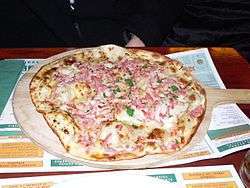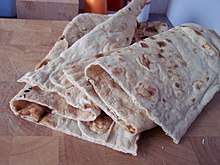Flammekueche
Flammekueche (Alsatian), Flammkuchen (German lit. "flame cake") or tarte flambée (French) is a speciality of the historic regions of Alsace, Saarland, Baden and Pfalz at the French-German border region. It is composed of bread dough rolled out very thinly in the shape of a rectangle or oval, which is covered with fromage blanc or crème fraîche, thin-sliced onions and lardons. It is one of the most famous specialties of the region.[1]
 | |
| Alternative names | Flammkuchen, Flàmmeküeche, Flammkuche, Tarte flambée |
|---|---|
| Place of origin | French-German border region: Alsace, Baden, Pfalz |
| Main ingredients | Bread dough, fromage frais or crème fraîche, onions, lardons |
| Variations | Au Munster, gratinée, forestière, sweet |
The name of the dishes varies in local dialects; it is called Flàmmeküeche,[2] or Flàmmaküacha in Alsatian, or Flammkuche in Lorraine Franconian. All these names translate as "pie baked in the flames." Contrary to what the direct translation would suggest, tarte flambée is not flambéed but is cooked in a wood-fire oven.[3]
Varieties
There are many variations of the original recipe in terms of the garniture. The standard variations are:[3]
- Gratinée: with added Gruyère cheese;
- Forestière: with added mushrooms;
- Munster: with added Munster cheese;
- Sweet: dessert version with apples and cinnamon, or blueberries, and flambéed with Calvados or another sweet liqueur.
History
The dish was created by Germanic farmers from Alsace, Baden and the Palatinate who used to bake bread once a week. The Flammekueche was originally a homemade dish which did not make its urban restaurant debut until the "pizza craze" of the 1960s. A Flammekueche would be used to test the heat of their wood-fired ovens. At the peak of its temperature, the oven would also have the ideal conditions in which to bake a Flammekueche. The embers would be pushed aside to make room for the cake in the middle of the oven, and the intense heat would be able to bake it in 1 or 2 minutes. The crust that forms the border of the Flammekueche would be nearly burned by the flames.[4] The result resembles a thin pizza. After the annexation of Alsace by France, the Flammekueche made its way as tarte flambée into French cuisine.
See also
- List of bread dishes
- Zwiebelkuchen

References
- Villegas, Maria (2005). "Tarte flambée". The food of France: a journey for food lovers. Murdoch Books. pp. 56. ISBN 978-1-74045-471-1. Retrieved 26 February 2010.
tarte flambee.
- "Petit lexique français-alsacien pour faire les courses : Kommissione màche" (PDF). Olcalsace.org. Retrieved 22 August 2019.
- Helga Rosemann, Flammkuchen: Ein Streifzug durch das Land der Flammkuchen mit vielen Rezepten und Anregungen [Flammkuchen: A foray into the land of the tartes flambées with many recipes and suggestions] (Offenbach: Höma-Verlag, 2009).
- Rosemann 4–5.
.jpg)
